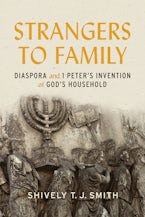In this stimulating study, Shively Smith examines the constructions of diaspora in 1 Peter as well as its presentation and negotiation in Daniel, Letter of Aristeas, and Philo. The result is a rich, multidimensional exploration of a versatile and elastic category of importance not only for reading these ancient texts but also for contemporary diaspora peoples.
~Warren Carter, Professor of New Testament, Brite Divinity School, Texas Christian University
Shively Smith has made a wonderful contribution to the dialogue of 'diasporic thought' with Scripture by providing a careful reading of 1 Peter. Smith brings 1 Peter into dialogue with other 'diasporic texts' in late Second Temple Judaism (the Daniel Tales, Aristeas, and Philo) in ways that not only confirm many of her proposals, but also effectively highlight the crucial conceptual context of 1 Peter in the widespread debates and discussions about the Jewish condition in the late Second-Temple Period throughout the Near East. Smith's concluding reflections promise even more interesting work to come.
~Daniel L. Smith-Christopher, Professor of Theological Studies, Loyola Marymount University
Shively Smith provides us with a careful and complex analysis of 'diaspora thinking,' using analytical categories from both 'the ancients' and contemporary scholarship. The text and context of 1 Peter has the primary place in this study, but today's contexts and concerns are not neglected, with the concluding chapter providing significant resonances and resources for our increasingly 'displaced' world.
~Gerald O. West, Senior Professor in Biblical Studies, University of KwaZulu-Natal
This ambitious, clearly written book first focuses on an exegetical analysis of 1 Peter, then enriches our knowledge of this epistle by contextualizing it within concepts of diaspora found in Hellenistic and Roman Jewish literature. 1 Peter is seen as resistance literature that offers strategies for the development of a 'double consciousness' in a context of political and cultural threat--a double consciousness that is marked by time and space, by the temporariness of current diaspora, and by an awaiting of a heavenly home. By the end of Strangers to Family, the reader better understands how to read 1 Peter as evidence of complex resistance, of negotiations with structures of power, and of a Christian imagination that is rooted in diversity and difference.
~Laura Nasrallah, Professor of New Testament and Early Christianity, Harvard Divinity School
Near the end of her book, Shively Smith poses the provocative question of what she, as an African American woman, is doing giving an appreciative reading of 1 Peter--a letter that appears to endorse subordination and servitude. Smith offers a fresh, eye-opening interpretation of the letter in the context of Jewish diaspora existence. She argues that 1 Peter 'constructs a double social reality,' fostering a double consciousness that allows the creation and preservation of a strange new fellowship that transgresses social and cultural boundaries, while neither conforming fully to dominant norms nor openly rebelling against them. The letter is a 'writing from the underclass for the underclass, not the overlord.' Smith's comparative sketches of the diaspora visions of Daniel, the Letter of Aristeas, and Philo bring the picture sharply into focus. Strangers to Family is necessary reading for everyone interested in the social history of early Christianity and Hellenistic Judaism, as well as for everyone interested in the theological interpretation of exile and diaspora in the New Testament.
~Richard B. Hays, George Washington Ivey Professor of New Testament, Duke Divinity School
Overall, this book is extremely well-written, and filled with many valuable insights. Especially illuminating is the way that 1 Peter's vision of diaspora is set in contrast to that of other Second Temple authors, thereby emphasizing the letter's unique perspective.
~Travis B. Williams, Expository Times
Shively Smith offers a powerful reading of 1 Peter as diasporic literature that teaches its audience how to navigate the world as Christians.
~The Christian Century
Strangers to Family is an interesting historical analysis with direct implications on contemporary life. This combination of scholarly investigation and tangible significance makes Strangers to Family worth the time and effort.
~Mark Owens, Journal of the Evangelical Theological Society
This is a valuable addition to 1 Peter studies and takes its rightful place among the volumes that have opened up our understanding of this vital letter in the New Testament
~Andrew M. Mbuvi, Review of Biblical Literature
Seldom is scholarship so well written, engaging, and informative. It is also timely and pertinent. S.'s discussion illuminates how those without power, Christian or otherwise, can negotiate contexts in which they are vulnerable. It provides strategies for refugees, undocumented workers, and the poor and oppressed in any diaspora situation, as well as allows those in power to better empathize with the plight of the marginalized within their borders.
~Duane F. Watson, Catholic Biblical Quarterly
The contribution of this study is not so much its exegesis of the letter of 1 Peter; much of the detail of Smith's interpretive work is readily available in the many commentaries and monographs published in recent years. Instead, its promise lies in the uncommon nature of the questions that shape Smith's analysis of 1 Peter's--and these other Hellenistic Jewish writings'--understanding of diaspora and construction of diasporic identity and existence.
~Joel B. Green, Interpretation: A Journal of Bible and Theology
Smith's valuable study clarifies the meaning and importance of 1 Peter's diaspora motif, seeing it as an address to those marginalized because of their beliefs, transforming their diaspora existence into a positive, and offering them one strategy for survival.
~Kent E. Brower, Journal for the Study of the New Testament
[ Strangers to Family] is a model of how serious biblical scholarship, rooted in careful examination of texts in their historical context, can illuminate modern-day issues. As such, the book deserves a wide and appreciative audience.
~Mark W. Hamilton, Restoration Quarterly

